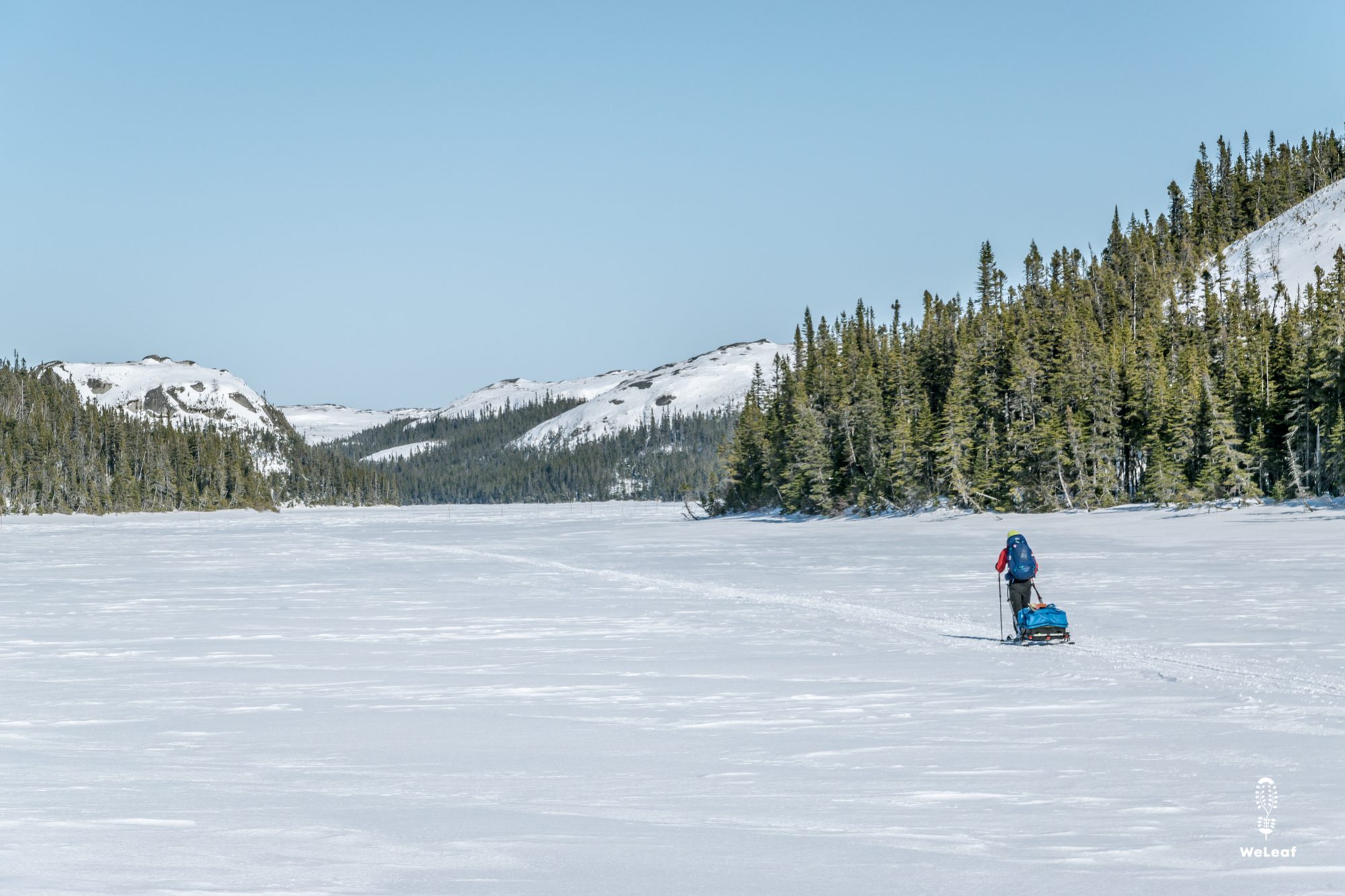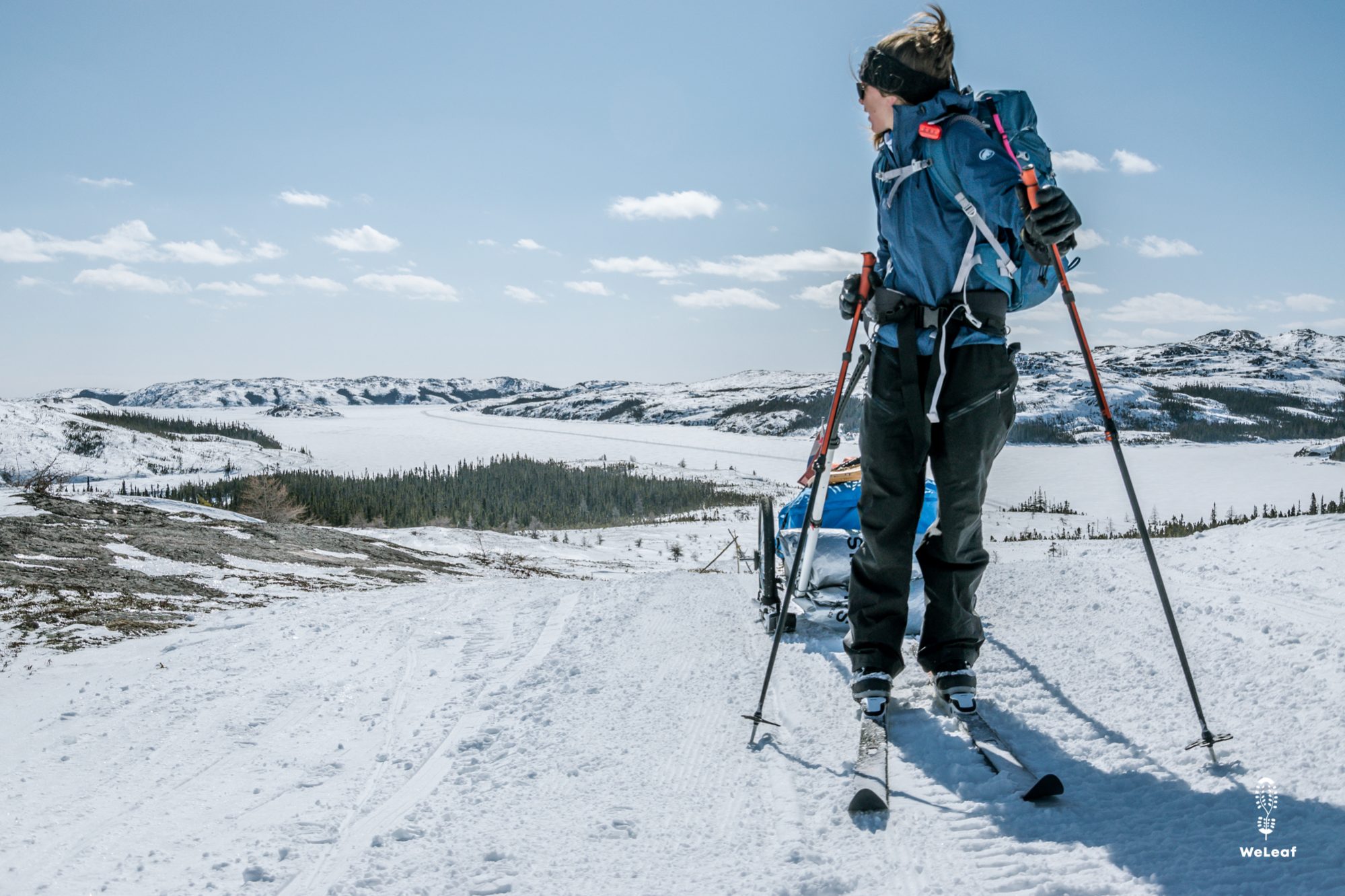
From heroes to scapegoats in one day

Love of wood
May 29, 2020
10 essential items on your packing list
June 10, 2020
Friday March 13th - Tête-a-la-Baleine
We'll skip a few stories to update our situation. The other stories about our ski adventure will come online later.
What started as something far-away slowly crept closer. The corona virus migrated from China to Europe and slowly spread around the world. On skis we were very far from this reality. Every five days we came to a village and saw updates on our phone. Public life was gradually restricted in Belgium and the Netherlands. We were lucky to be in such a remote area because the virus would never arrive here. In addition, skiing is a kind of quarantine where we sleep in the tent, we hardly come into contact with people and are permanently outdoors. We are perfectly healthy and don't worry.
A few days before Zoë's birthday, we arrive in Tête-a-la-Baleine, a small village of barely two hundred inhabitants. Like the other villages on the Lower North Shore, it is isolated from the outside world. Summer access is only possible by ferry or plane. In winter, the rivers and bays freeze, creating the White Trail that we follow. It is a few months of freedom for the population and connection to the paved road is suddenly possible. Various hockey tournaments and carnival parties take place and everyone travels between the villages. Tourists on snow-scooters come to explore this unique route from the rest of the province. We are the odd mans out on skis and enjoy the freedom that winter brings. In Tête-a-la-Baleine we have a name of a person, a friend of our previous host in the village of La Romaine. He's not at home so we wait in front of his house. We still have our ski clothes on and cool down quickly when we are not moving. Next to the house is a small hotel for the tourists on snow-scooters. Olivier walks in and asks if they have a paper and a pen so we can leave a note for the neighbor. The woman is cranky and Olivier tries to find the cause. In front of her is a large book with all reservations. Almost all names for the following days are crossed out. "Are there many guests in the hotel" Olivier asks carefully? "Almost nobody, everything has been canceled," she says dejectedly. "First the problems with the ferry and now the virus. People don't want to come anymore." Did the corona fear also arrive in Canada?
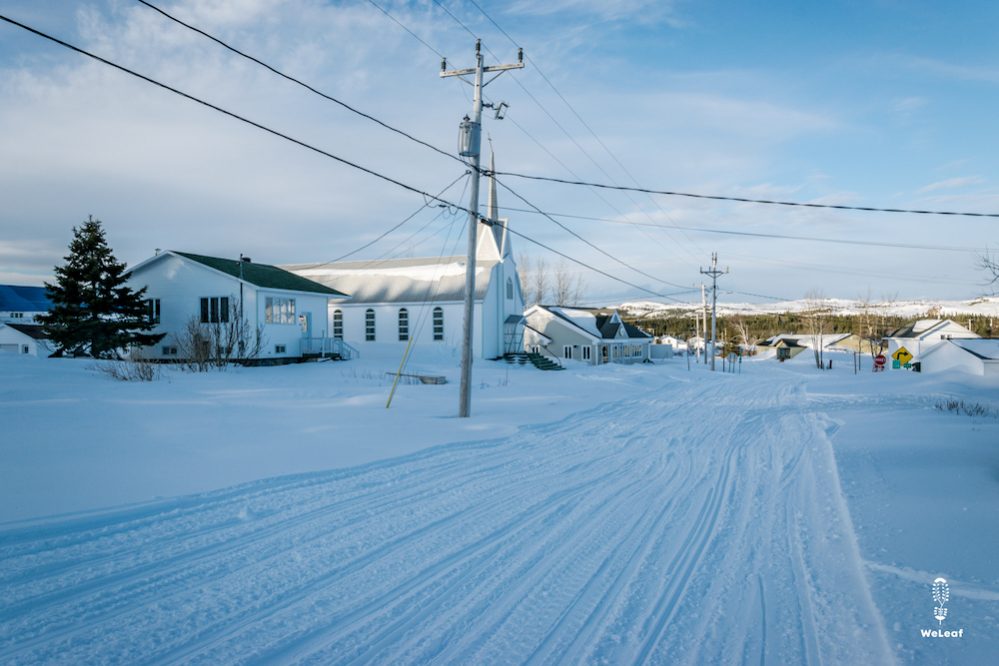
Tête-a-la-Baleine
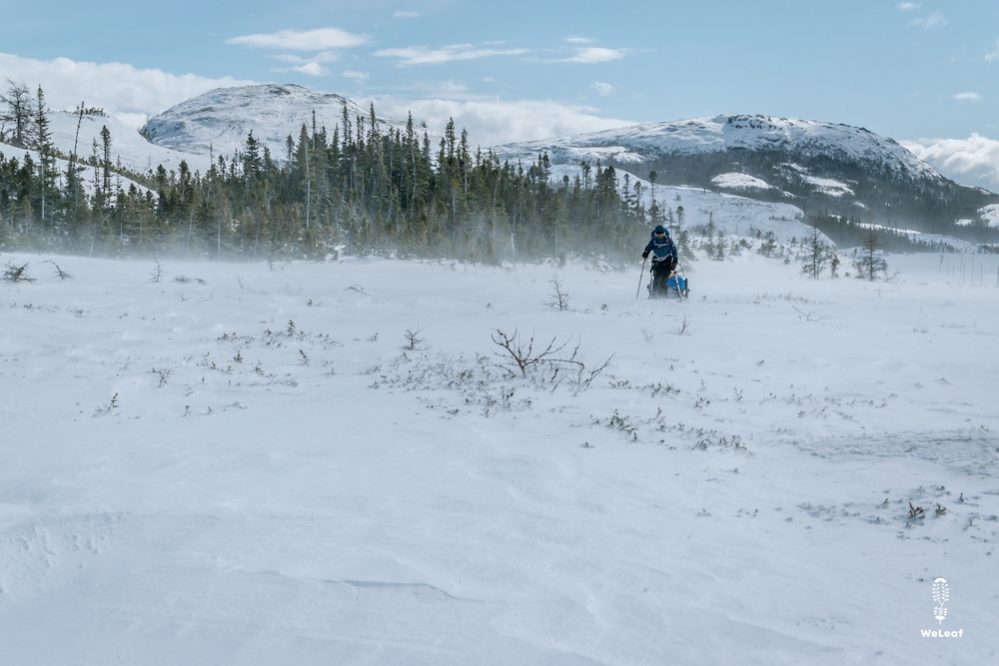
Outside, Zoë is chatting with two men. They introduce themselves warmly with an stretched hand, without any concern. Tom and Marco are the spouses of teachers at the local school. "All schools in Quebec are closing for two weeks," said Zoë, who updates Olivier into conversation quickly. 'Here as well?'. "All over Quebec, including here,” Tom says, an Australian who has lived in the village for almost 10 years. There are barely five students in school, primary and secondary combined. You can hardly speak of a group, but they are subject to the rules of the province, so they also have to close. In addition, a major event was planned with groups coming from French-speaking schools in the rest of Canada. All events with more than 100 people are suddenly prohibited. Large quantities of food were flown in from the city, just like toilet paper which is now abundant in the village. Tom and Marco invite us to the school building that has to close in a few hours. They have way too many tacos for tonight and we can solve that problem after a couple long days on skis. Suddenly we realize that the corona virus is getting closer. However, we are not worried because the area is very remote and the villages are small. The people of the Lower North Shore live their own lives, with their own rules and the virus is something from the outside world. Not that we ignore it, we have families and friends at home where we closely monitor the situation, but it will not have an impact on us personally. We thought.
We leave Tom and Marie after a weekend with a lot of food. It is two days of skiing to La Tabatiere where we can pick up our last food package at the post office. When we arrive in the village, people hardly say goodbye. There hardly is a small nod with the head. We get a strange gut feeling, but blame the strong wind and the grey day. A blizzard is on the way and it is no weather to be outside for long. While Olivier is already skiing to the post office, Zoë asks for a place at the church to be protected from the blizzard. In the house next to the church she almost gets the door on her nose. "We have nothing to do with the church and cannot help you." Also in the local shop they cannot help us and everyone quickly refers us to the first person they see on the street. People keep a distance and do not want to talk to us. We don't feel like putting more effort in finding a place, but we are standing next to the post office with three food packages to pack, a snow storm is coming and we need to check the weather forecast. We make a final attempt at a small office next to the post office.
"We are closed," the woman shouts at Zoë when she opens the door.
"Oh I'm so sorry, I only have one question," Zoë tries friendly.
"Normally we are more friendly here on the coast, but with this corona virus everything is different," she snaps.
Still she picks up the phone and calls the mayor. The helpfulness of the North Coast that we have experienced in the past two months and that is grounded in culture, is getting the upper hand. Not much later, the mayor calls back.
"You can stay in the hockey arena. Melinda will pick you up." On the door we see a paper that all public buildings are closed since today. Next to it is a note with the advice to boil the drinking water for at least one minute, a precaution for the virus. We look at each other, open-eyed. "People are going crazy," we say without words. Where does this suddenly come from.
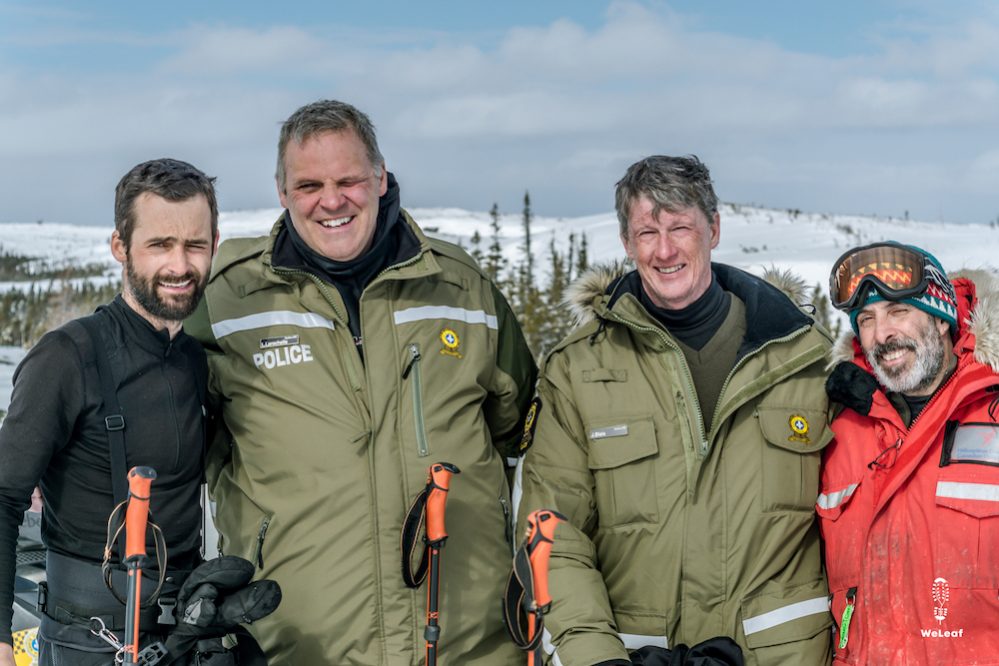
Our friends of the police on the Route Blanche
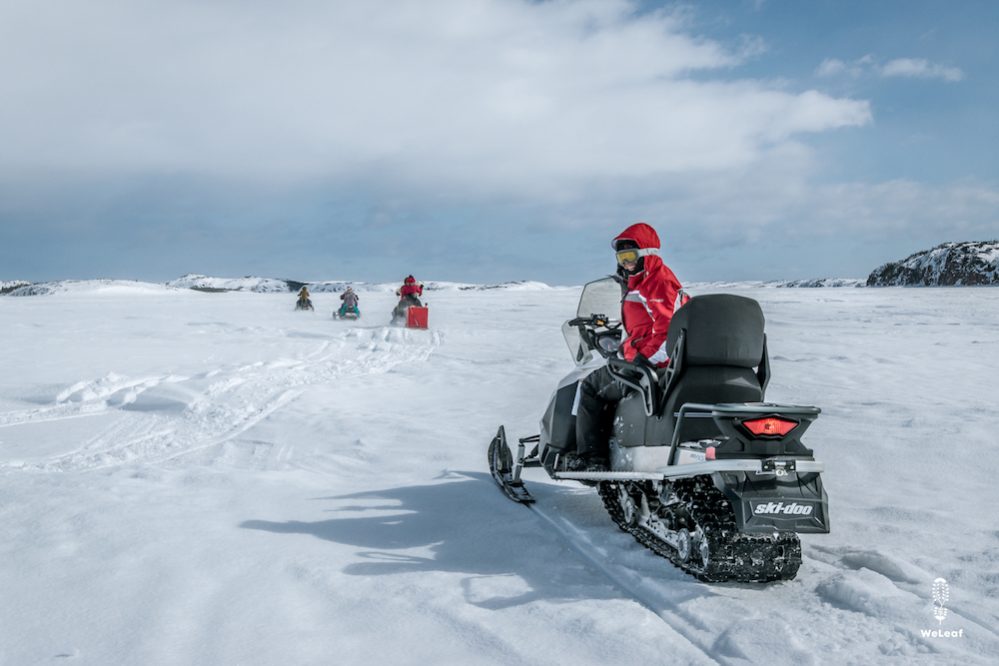
Suddenly we realize the consequences for the rest of our journey. From now on people will look at us suspicious and doors will close instead of opening. We are suddenly not the interesting foreigner, but the dangerous European, the possible carrier of the virus, the black sheep. We look at the food packages and know that we have a supply of food for almost fifteen days. "We can survive without the villages," Olivier thinks aloud. "With a bit of luck, we occasionally get a WiFi password to update our parents." We appease ourselves that only a few people are afraid. In the meantime, we have a message from our host in the next village, Sainte-Augustine. We are very welcome and they are waiting for our arrival. It blows away all negativity and we continue without worries.
The next day, nothing seems to have changed on the trail. We meet our police friends who travel back and forth between Kegaska and Blanc-Sablon, the start and end points of the trail. No news about the virus and they invite us to their office when we arrive in Blanc-Sablon. Many people stop to chat on the way and everyone is friendly as we are used to. In Sainte-Augustine, Darrell and Lucie take us to their weekend cottage on an island. We drive there with the snow-scooters and are once again separated from the real world. "Another eight days of skiing until Blanc-Sablon where the White Trail ends" and we can hardly believe how fast time has gone. Darrell tells us the ideal day schedule to the next village, including all the details about the entire route. On Sunday afternoon we drive back to their house and have to prepare the last things to continue skiing tomorrow. We have a message from Olivier's parents. "Zoë and Olivier, please call us when you can". We know what it means. Olivier's grandmother's medication was stopped last Friday, yesterday afternoon she passed away peacefully, aged 85. The family cannot come together, the grieving process is individual and separated. An unreal situation. When we were home from Zoë surgery more than a year ago, we spent as much time as possible with Olivier's grandmother. That's our memory, a peaceful memory. Back then we decided not to come home if she would pass away. The reality is tougher and suddenly we realize that we can’t be with the family and can't offer company to grandpa.
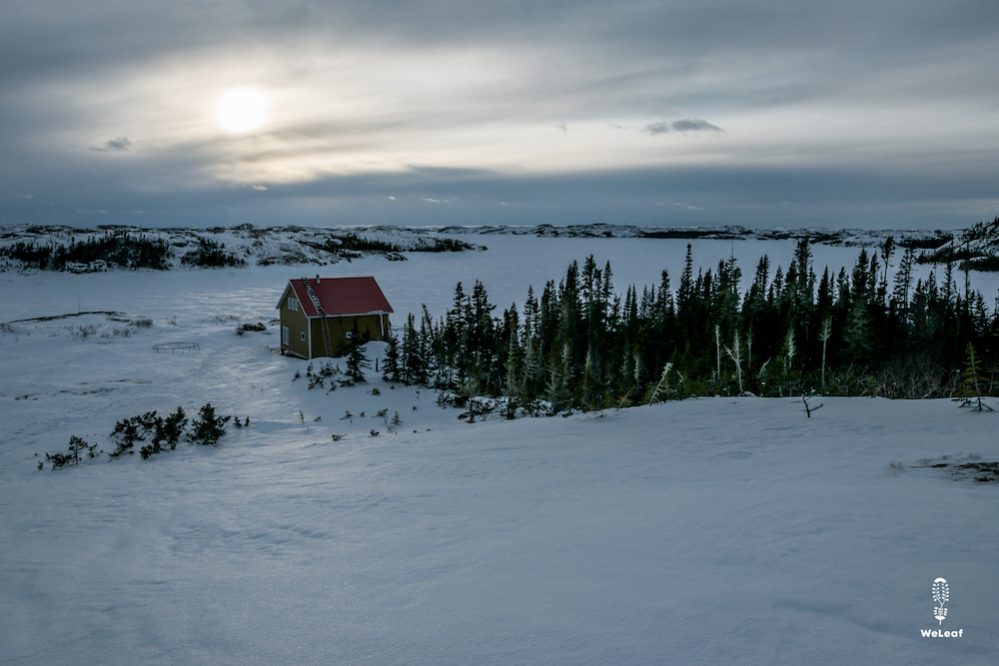
Darrell en Lucie's cabin
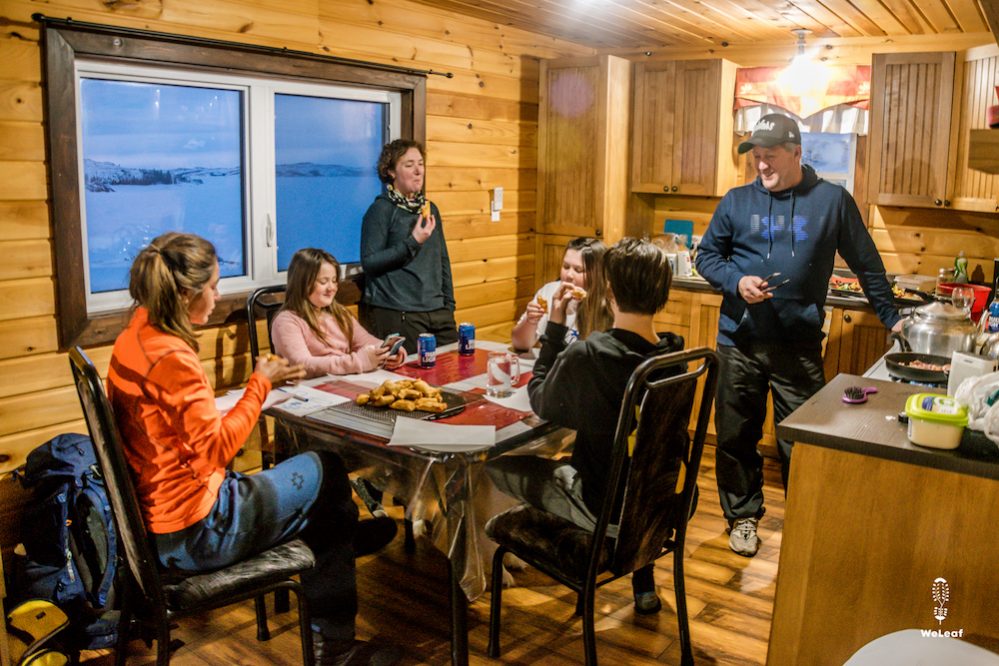
In the cabin, without any worries
We hang up the phone and see a bunch of messages on Facebook. Zoë opens her last post in which she admires the Lower North Shore, the people, the hospitality and the culture. Under the post are 150 responses, almost all of them are negative, aggressive and personal. 'STAY AWAY' from the Lower North Shore, Go Home, You shouldn't be here, Don't come to the small town of Old Fort, You are a danger to all of us, You will spread the virus, You will infect us, You are dumb and the people that host you even dumber, you are so selfish and so much more. Tears are in Zoë's eyes, Lucie also cries and can't believe her fellow villagers can say this. "We are not like that, people are not themselves," she tries to convince herself. "Don't read it Zoë, remove it," says Olivier. But we realise what happened. The scapegoat has been found, and if we don't pay attention, we get a lot more hatred on us. A few days ago, we saw messages of cycling-friends leaving South America as quickly as possible, out of safety, often treated with hostility. We couldn't imagine it here. We are safe in Canada, we are in a good place, but the truth is in corona. Anxiety is a bad advisor and the panic spreads much faster than the virus. Mainly older people live in the villages and there are no hospitals. Suddenly there is great fear among the population. A fear that manifests itself in protectionism and hostility towards everything that does not belong here. For two months we were the story of the north coast, the heroes. People stopped every day, curious about those second strange skiers on the trail. They never saw that and our story traveled far ahead of us. Everyone wanted to see us, meet us, take a picture with us. In one day we aren't the interesting skiers, but contagious Europeans, the possible carrier of the virus, the scapegoat.
One question remains. What do we do?
The schools were still open a week ago, now the world is turned upside down. The ferry we would take to Newfoundland is closed, which means we would be stuck in Blanc-Sablon. All possibilities go through our heads, but it is chaos. Darrell and Lucie immediately say that we are welcome until everything is over. We realize that this will take at least a few weeks. Is this a place where we want to be stuck, also if there is a real lockdown and we are locked here? There is no road here in San Augustine, as soon as the ice breaks out we can no longer move. The situation is also stressful for the family with two young children, and two more people make it extra stressful. We prefer to ski further to Blanc-Sablon, the beginning of the road and remain there in isolation, to continue our plan afterwards. We have three contacts who invited us at the beginning of the road. We contact them quickly, but one by one they send an honest answer that they don't want to take risks and can't help us. We cannot continue skiing without the certainty of a safe place. The reality is there, suddenly the skiing is over. Still, the concerns take away this realisation, we must have a plan quickly. We go through the contacts earlier on the trail. We are thinking of all the places where we have contacts in the direction of Halifax, where we would travel to take our boat to Europe in early May. Baie-Comeau is an option, as is Quebec City. We would like to go back to Fort Kent, to Pat and Carl where we feel so at home, but the border with the US is closed. We can only go to Baie-Comeau with a small plane, € 1000 pp for a short flight. "That is too much, we will have to stay here."
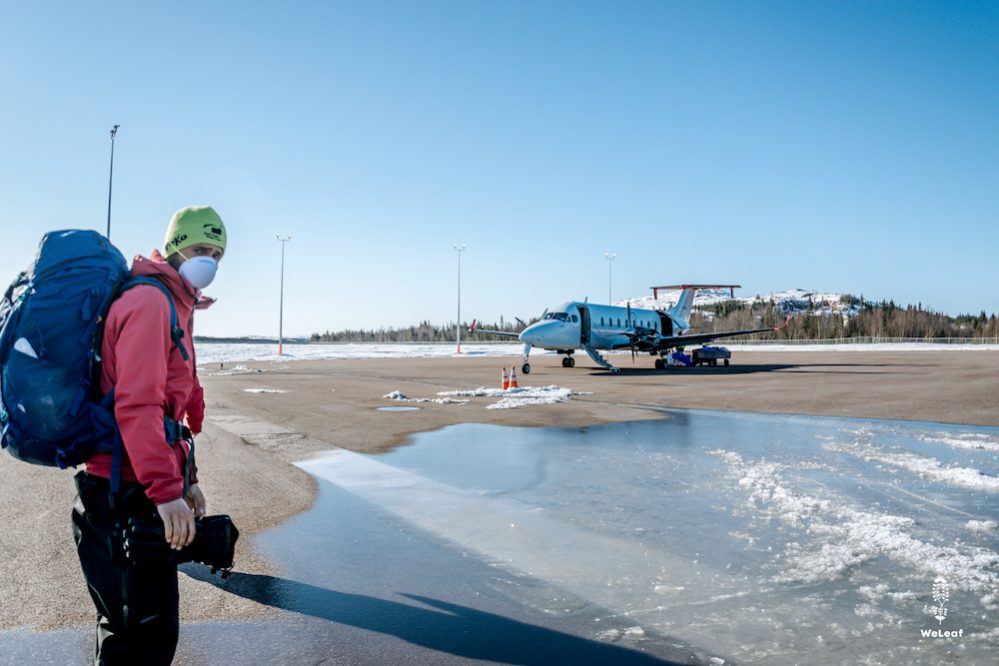
Mandatory mouth caps in the plane
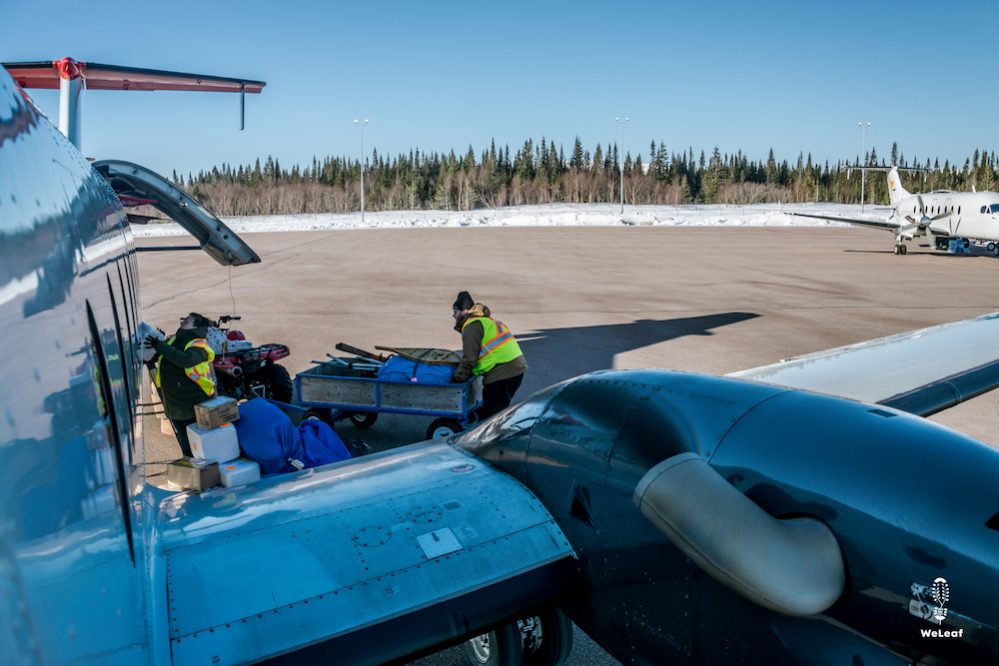
Only 8 people allowed in the plane, but our gear can come with us
Monday morning we call the embassy and travel insurance. No coverage for corona and the embassy does not necessarily recommend returning home. Darrell calls the airport across the river. He can arrange a ticket for € 400 per person, including all our gear. It will take half a day before we can make a decision. Our minds are confused, Olivier is thinking about his grandmother and reports on television change every hour. In the afternoon the government applies an unexpectedly fast lock down in the province of Quebec. We decide to leave and choose a larger city where we can stay anonymously, have a nice family who wants to receive us and our possibilities to move are better. The far-away virus now keeps us awake. We remain positive and believe it will be calmer in a few weeks. Our freighter is still scheduled for the beginning of May and we have enough work to fill our time. We are very disappointed that we have to end the ski adventure like this and leave with a sour feeling to the culture we loved so much. We don't blame people and we remember the enormous hospitality we have experienced. We are proud that we have been on skis for two months and have covered almost 1,000 kilometers. In a few months, normal life will resume, just like our trip, and we only remember that beautiful time on the north coast of Canada.
